Selling milk yourself – farmers give their advice
As milk prices fluctuate, many dairy farmers considered selling direct to raise their returns.
Others who were already retailing milk saw an uplift in sales as public sympathy for the plight of dairy farmers grew.
We caught up with some of those whose farms have already been featured on Farmers Weekly’s Milk Map, to hear their experiences and advice on selling direct to the public.
Plus we investigate the growing popularity of milk vending machines in the UK.
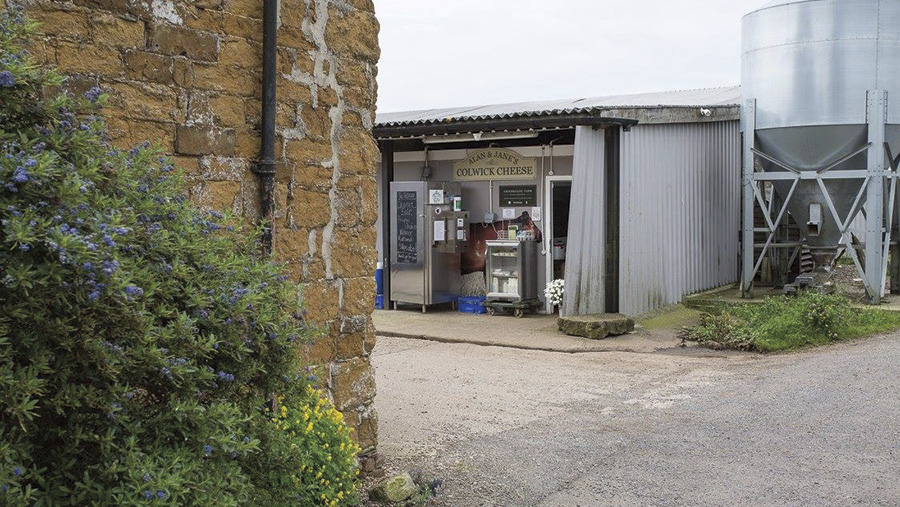
The Belvoir Ridge Creamery
Farmers Weekly’s Milk Map
The map was started in August 2015 to show consumers where to buy milk and other dairy products direct from farm.
New businesses are added almost weekly and it now has details of more than 100 producers who sell direct in various ways.
The map came about because we were often contacted by members of the public wanting to know how they could be sure that what they paid for their milk was going back to the farm where it was produced.
If you know of others selling direct from the farm, email fwbusiness@rbi.co.uk and let us know about them.
Alan and Jane Hewson, Belvoir Ridge Creamery, Leicestershire (LE14 4EF)
Alan and Jane Hewson’s fresh milk is so popular, people are trying to steal it.
His true motive might have been monetary, but in late February a man did try to break into their vending machine.
He was caught on the CCTV installed in the veranda next to the dairy.
Each week the Hewsons sell 200 litres of raw and pasteurised milk from their machine, which they set up two years ago.
See also: Map where to buy milk direct from farm
Some of the milk from their herd of 50 Red Polls used to go to a processor. But now they process all their own milk on farm, with most being turned in two soft and one hard cheeses.
“We’ve only got a small farm, so we had to develop something,” Mr Hewson says.
“The dairies obviously want more volume from farms so they can pick up more milk in one go.
“We were not in a position to do that and actually have reduced our milk [production] for our needs.”
The venture has been successful so far, he says.
People can drive up and fill their bottles from first thing in the morning until 7pm.
They are willing to pay £1/litre for the fresh product.
“The general public are really, really supportive and love to have a product that they can come and get fresh and they know who we are.”
Mr Hewson says the process all went quite smoothly, the break-in excepted.
The vending machine fitted well with the established cheese business, as the Hewsons had all the pasteurising equipment and expertise.
Any unsold milk every day is able to be used for cheese, so nothing goes to waste. What’s their top tip?
“You need to get environmental health and all those people on your side right from the first day.
“If you get them on board, we have found them nothing but helpful.”
“Within the dairy industry we are used to jumping through hoops, so it is just an add-on. We are used all that washing and cleaning.”
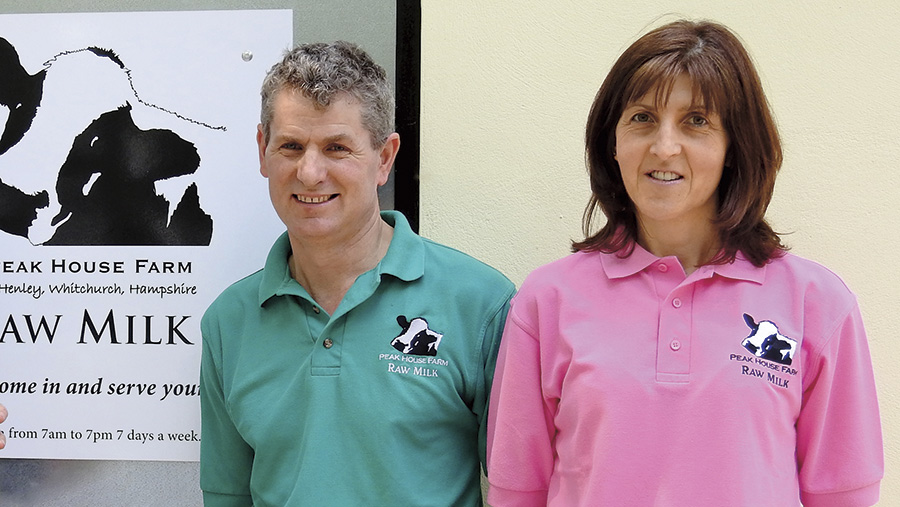
Mark and Jenny Stevens
Jenny Stevens, Peak House Farm, Hampshire (RG28 7QJ)
The Stevens family have only been selling raw milk since last summer – but it has proved hugely successful.
They had been interested in selling direct for a while, after relations of the Crickmore family, who run Fen Farm Dairy in Suffolk, stayed in the farm’s B&B in 2013.
They got talking and went to East Anglia to see how it worked.
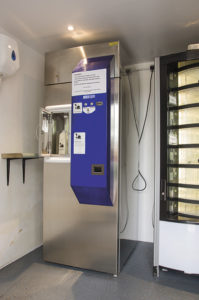
Jenny and Mark Stevens’ vending machine
But it was the recent dairy slump that pushed them into action.
“The milk price was going down and down, and we were catapulted into doing something,” says Jenny Stevens.
“It has been the best thing we have done because we were looking at a future with milk possibly at 14p/litre.”
They took the plunge and opened a raw milk vending machine in August 2015.
The opening day drew 250 people to the farm, where Mrs Stevens baked scones and they let the public meet some of the cows.
They also had sweatshirts and T-shirts printed, along with advertising leaflets.
The burst of publicity saw the family interviewed on TV and in newspapers.
Today they sell about 80 litres of raw milk each day, in a shed on the edge of the farm.
The rest of the 2,500 litres of daily production from their 100 cross-breds goes to Arla, as members of the co-op.
But that 80 litres is very profitable, sold at £1/ litre.
“The more we are in control of what we are selling the better for us, because we can command the price. And no-one has complained about it,” Mrs Stevens says.
The raw milk shed has a whiteboard where customers can ask questions, which the family answer in a different colour pen.
Mrs Stevens says talking to the public and educating them has been essential. That, along with their marketing, has built a loyal following.
One customer does an 80-mile round trip from Oxford to buy milk.
Mrs Stevens says would-be direct sellers should be aware of the time commitment.
Their machine is filled up every other day and sometimes more often, if demand surges.
Making sure the parlour is “A1” clean, with extra measures such as a cluster-flushing system, also takes a while longer, she says.
But jumping into direct-selling has been essential for their business and the Stevens are now optimistic about the future.
“We just have to keep thinking of ways to keep raising money,” Mrs Stevens adds.
“We have two boys who are already passionate about wanting to be dairy farmers.”
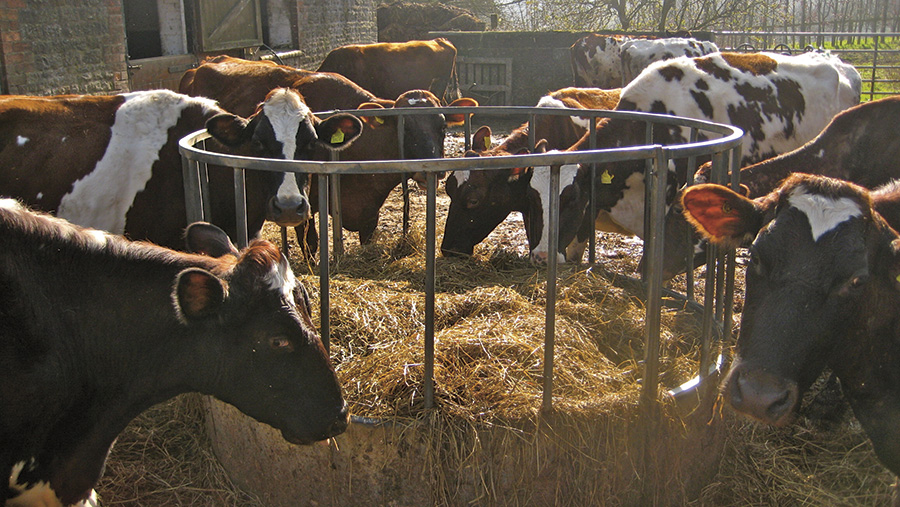
Josh Healy’s herd
Josh Healy, North Aston Dairy, Oxfordshire (OX25 6HX)
Most farmers would be shocked at the size of Josh Healy’s herd.
He milks 18 Ayrshires, which produce up to 1,200 litres/week. He does this on 15ha rented off an organic livestock farm in Oxfordshire.
The four abreast parlour is in same building that houses the cows, bulk tank room and processing space.
But selling milk straight to the public helps the dairy support Mr Healy, one full-time worker and another part-time.
It started with a £16,000 investment between Mr Healy’s father and a business partner.
They bought three cows and piggybacked on an existing veg box scheme, run off the same farm, with their milk.
They quickly grew their herd, but have stayed at the small scale ever since.
All the milk is pasteurised and sold in one-litre glass bottles, at £1.20 for full-fat and £1.40 for semi-skimmed.
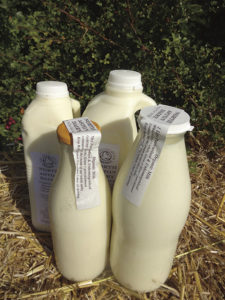
North Aston Dairy’s milk
This is delivered to 350 households, more than half of whom live within two miles of the dairy.
Mr Healy also goes to Oxford Farmers Market each week. This is a good outlet for coping with the fluctuating milk supply throughout the year, as there is no commitment for how much they will sell.
He has brought in new products too, making yoghurt and cream.
“It adds a lot of value. It means we can increase sales without adding customers,” Mr Healy says.
Staying a small operation means Mr Healy has to think creatively about running efficiently.
He shares machinery with his landlord and tries to match calving patterns with the peak demand for milk, which tends to be school-term time.
The dairy spikes in popularity, with lots of new customers getting in touch every time the tough economics of milk production hit the news.
Mr Healy says he hopes to inspire some larger producers to consider about direct selling.
“Hopefully we can open people’s minds that it is a possibility,” he says. “But I understand that for some they don’t want to do all that.”
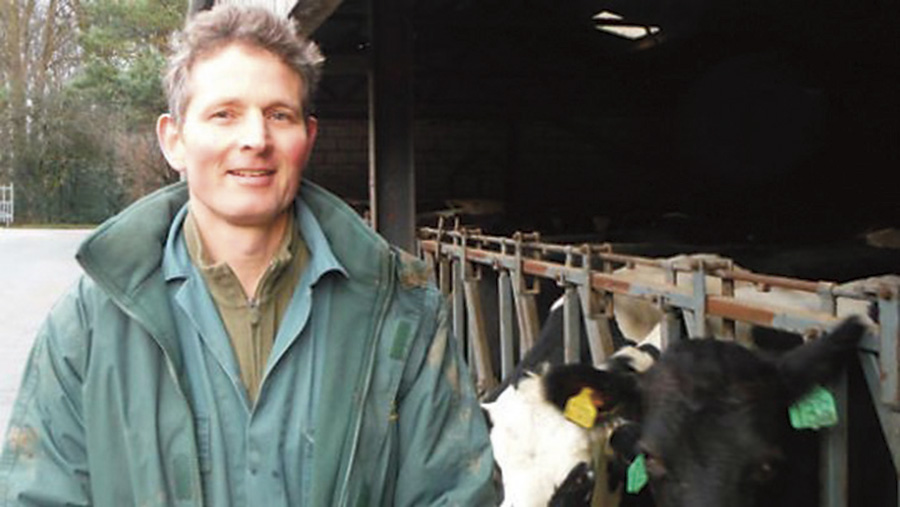
Richard Park
Richard Park, Low Sizergh Barn, Cumbria (LA8 8AE)
Richard Park and his family have run a farm shop on at Low Sizergh Barn for 25 years.
That meant opening a raw milk vending machine this March was not an enormous leap. He knew there would be a steady flow of customers.
“Because we have the shop and an area that overlooks the milking parlour, a lot of our customers already had a connection with the cows,” Mr Park says.
“And we have a good location on the side of the main southern route into the Lake District.
“It is not something you want to do if you are down a country lane miles from anybody.”
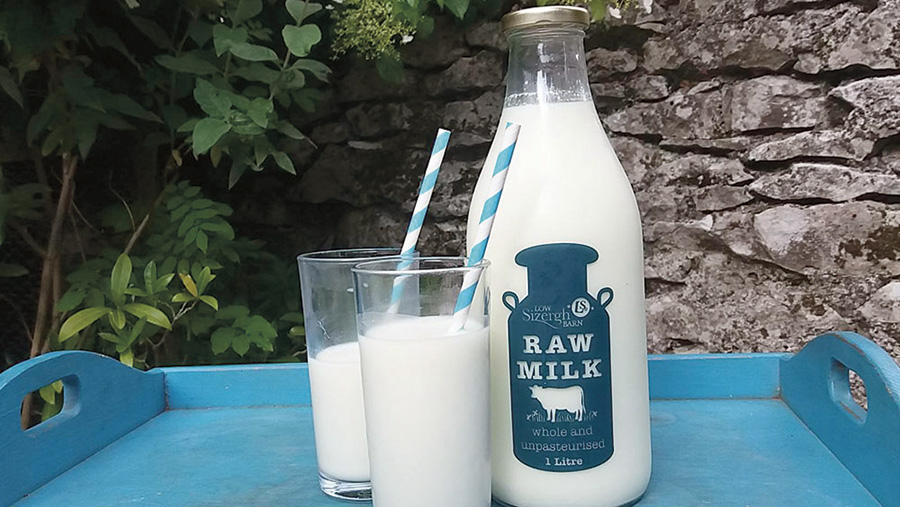
Low Sizergh Barn’s milk
Mr Park had been weighing up direct selling from his 170-head cross-bred herd for several years.
He sells milk to United Dairy Farmers but wanted to find some way of adding value.
In May 2015, Mr Park and his wife visited the Crickmores in Suffolk, like many others who have taken the plunge.
They spent the intervening months business planning and settling on the right machine.
“It was just like any investment: you have got to look at, ‘What are the costs? What is the return? Is that realistic?’
“Our machine is very well future-proofed. Our capacity is we can do 200 litres a day.”
Mr Park stresses the raw milk is not an easy option, especially when it comes to hygiene. He signed up early with the Food Standards Agency (FSA) to make sure the farm was hitting the standards for raw milk.
They “upped their game” in the parlour with cleanliness. All staff who handle the milk went on a hygiene course.
The vending machine is already above breakeven and Mr Park expects this to keep building, particularly over the summer.
They charge £1.30/litre, which is more than many others.
“We could have charged less. But [the milk] is a unique, special product, so you do not want to undervalue it.”
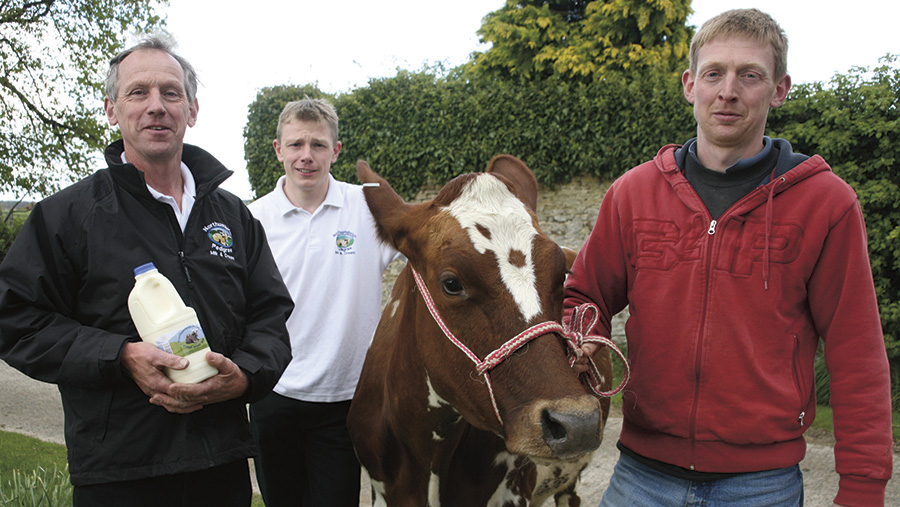
The Northumbria Pedigree Milk & Cream team
Paul Baynes, Northumbria Pedigree Milk & Cream, Northumberland (NE47 0DQ)
The Baynes are not new to selling their own milk – they’ve been doing it for more than a decade.
They started 11 years ago, when a milk price of 17p/litre was not enough to sustain three families.
They bought and put up a processing building, filled it with basic pasteurising and bottling kit, and started drumming up business.
Today, they sell half of their milk, 10,000 litres a week, to customers across the county, under the brand Northumbria Pedigree.
“The bottled milk is the only thing that is keeping us in milk,” says Paul Baynes. “We would not be milking if we had not diversified.”
All the directly sold milk is pasteurised. Three staff come in to help with bottling three days a week. Paul, his father and two other drivers look after deliveries, with vans running six days.
Running two big, complicated businesses in their own right, the milk production and the processing, has been possible thanks to the family structure.
Paul focuses on the direct-selling, while his brother, Richard, looks after the 150 cows. Their parents work on both, wherever they’re needed.
“If you take on milk processing, it is a full-time job,” Paul says.
“The people we know that have tried to juggle the two, one or the other has suffered. It is not like you can milk the cows in the morning then go bottle a bit of milk.”
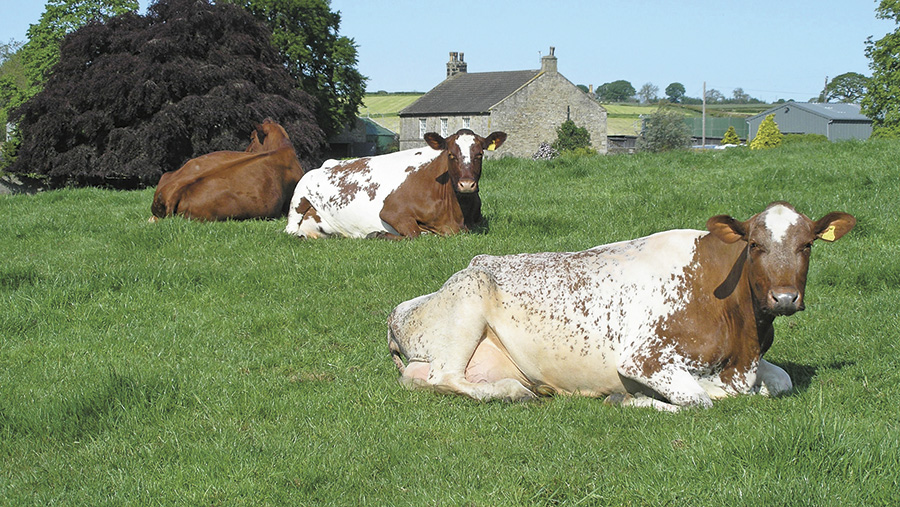
Part of the Northumbria Pedigree Milk & Cream’s herd
The Baynes, finalists in this year’s Farmers Weekly Awards Dairy Farmer of the Year category, sell their milk right across Northumberland, from the Cumbrian border in the west to coastal towns in the east.
Customers range from small village shops to cafes, restaurants and established farm stores.
Their wholesale price is 60p/litre, way above their co-op First Milk’s current rate. But Paul says most conversations with customers do not start with how much the milk costs.
“What sells our product is we offer a good service and a quality product. If we get those things right it tends to sell itself.”
What the machine men say
Vending machine sellers have seen a surge in interest over the past year.
Tommy Szebeni, director at the Milk Station Company, says the concept has taken a while to gather pace in the UK, after a longer history on the continent.
He has sold seven Swiss-made machines so far, of which three were installed in 2016.
“In the last few months we’ve definitely seen an upsurge in inquiries,” Mr Szebeni says
“A lot more people are looking for alternative ways of selling to processors.”
His machines start at £5,350, with more expensive models adding capacity and functions.
There is a fairly easy learning curve for farmers, he says, as they are used to maintaining and cleaning dairy kit.
Jonny Crickmore, from Fen Farm Dairy in Suffolk, set up the country’s first raw milk vending machine.
He and his brother, George, are now UK reps for an Italian model.
He has also seen a sharp rise in interest, with 19 vendors sold in the past 12 months.
Many of those already had some form of diversification, such as a farm shop or ice cream, so were used to processing or dealing with the public.
Anyone interested has to ask if it is really right for their business, he says.
They have to consider the business case, the cost and commitment to yearly FSA raw milk testing (and more regular, if they wish), extra attention to parlour hygiene.
The Italian machines also start at about £5,000 but the costs can rise to £20,000, depending on the kind of shed and extra equipment needed.
“It is not just making a quick buck. There is a lot of work involved. You really have to be aware of what you are getting yourselves into and the consequences of getting it wrong.”
